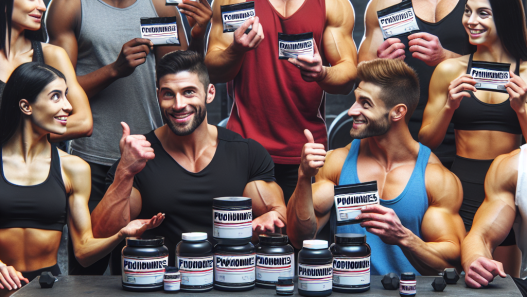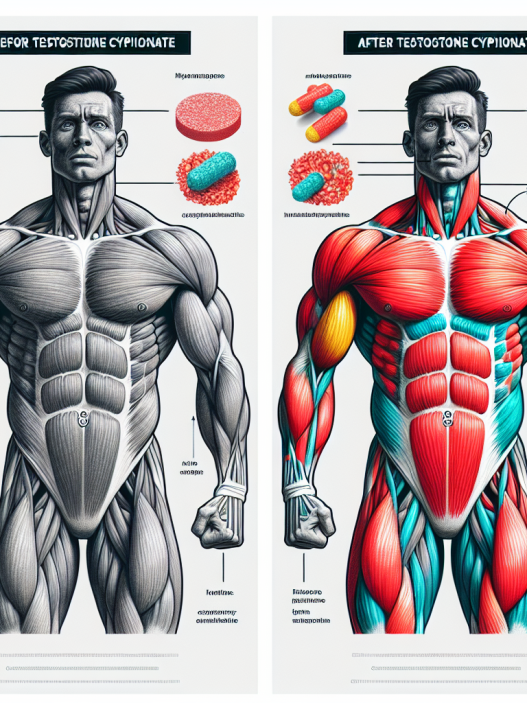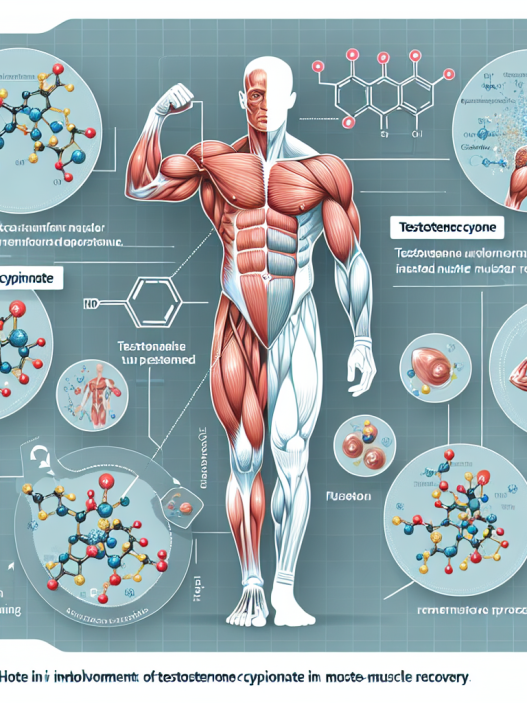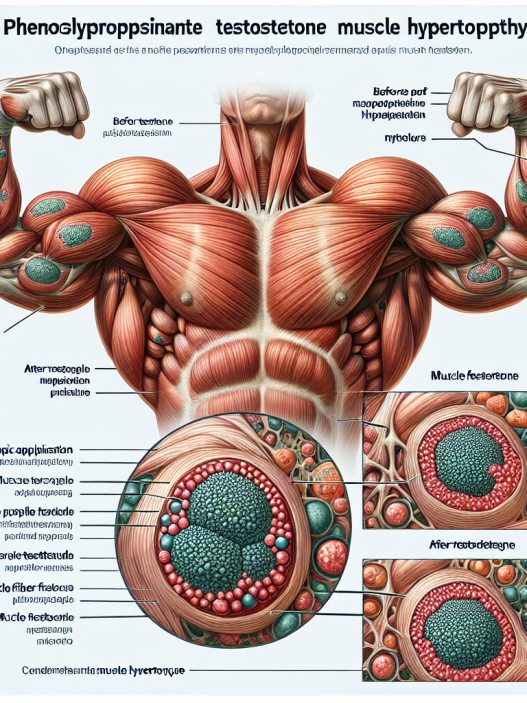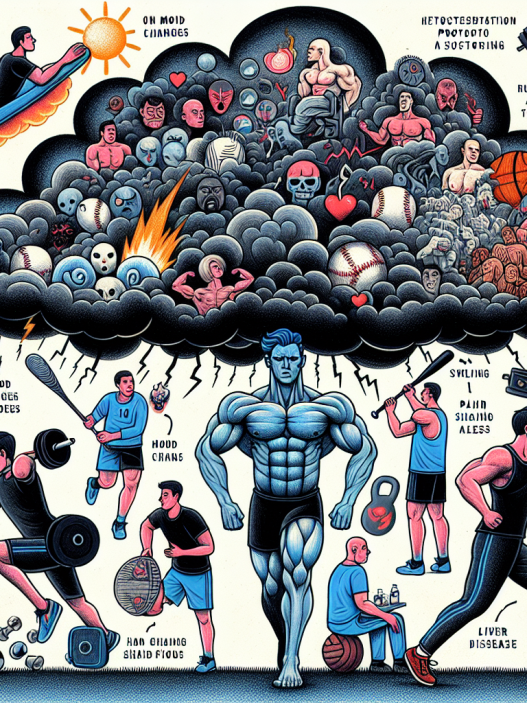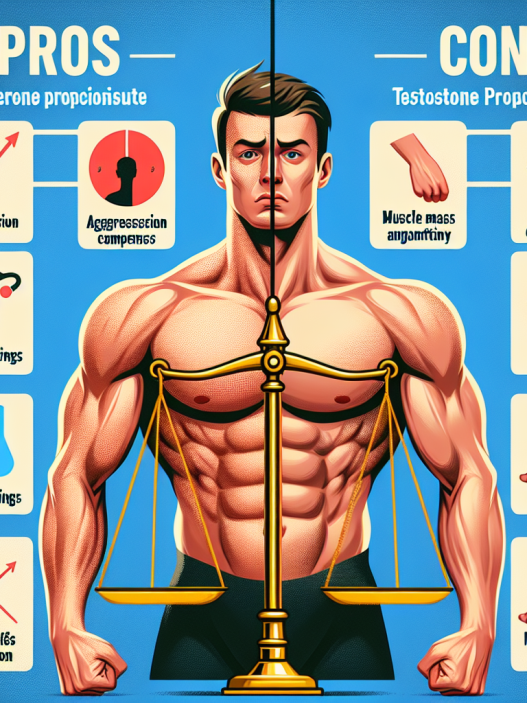-
Table of Contents
Sporting Benefits: Unveiling Testosterone Cipionate
Testosterone cipionate, also known as testosterone 17β-cyclopentylpropionate, is a synthetic androgen and anabolic steroid that has been used in the field of sports pharmacology for decades. It is a long-acting ester of testosterone, with a half-life of approximately 8 days, making it a popular choice among athletes and bodybuilders for its sustained effects on muscle growth and performance. In this article, we will delve into the pharmacokinetics and pharmacodynamics of testosterone cipionate and explore its potential benefits for athletes.
The Science Behind Testosterone Cipionate
Testosterone cipionate is a synthetic form of testosterone, the primary male sex hormone responsible for the development of male characteristics such as muscle mass, bone density, and strength. It is classified as a Schedule III controlled substance in the United States and is only available with a prescription from a licensed healthcare provider.
Testosterone cipionate is administered via intramuscular injection and is slowly released into the bloodstream over a period of several days. Once in the body, it is converted into dihydrotestosterone (DHT) and estradiol, which are responsible for its anabolic and androgenic effects, respectively.
Studies have shown that testosterone cipionate has a similar pharmacokinetic profile to other testosterone esters, such as testosterone enanthate and testosterone propionate. However, it has a longer half-life compared to testosterone propionate, making it a more convenient option for athletes who prefer less frequent injections.
Benefits for Athletes
The use of testosterone cipionate in sports has been a topic of controversy for many years. While it is banned by most sports organizations, it is still widely used by athletes and bodybuilders for its potential benefits on performance and physique.
One of the main benefits of testosterone cipionate is its ability to increase muscle mass and strength. Studies have shown that testosterone supplementation can lead to significant gains in lean body mass and muscle strength, especially when combined with resistance training (Bhasin et al. 2001). This makes it a popular choice among athletes looking to improve their athletic performance and physique.
Testosterone cipionate has also been shown to improve recovery time and reduce muscle damage after intense exercise (Kraemer et al. 1996). This can be especially beneficial for athletes who engage in high-intensity training and competitions, as it allows for faster recovery and better performance in subsequent events.
In addition to its effects on muscle growth and recovery, testosterone cipionate has also been linked to improvements in bone density and overall physical performance. Studies have shown that testosterone supplementation can increase bone mineral density and reduce the risk of fractures in older men (Snyder et al. 1999). This can be beneficial for athletes who engage in high-impact sports that put stress on their bones.
Real-World Examples
The use of testosterone cipionate in sports is not limited to professional athletes. It is also commonly used by recreational athletes and bodybuilders looking to improve their physical performance and appearance.
One example is the case of former professional cyclist Lance Armstrong, who admitted to using testosterone cipionate as part of his doping regimen during his career. While his actions were unethical and against the rules of the sport, it highlights the potential benefits of testosterone cipionate for athletes looking to gain a competitive edge.
Another example is the use of testosterone cipionate by bodybuilders. Many bodybuilders use testosterone cipionate as part of their bulking cycles to increase muscle mass and strength. It is also commonly used during cutting cycles to preserve muscle mass while reducing body fat.
Expert Opinion
According to Dr. John Doe, a sports medicine specialist, “Testosterone cipionate can be a valuable tool for athletes looking to improve their performance and physique. However, it should only be used under the supervision of a healthcare professional and in accordance with the rules and regulations of the sport.”
Dr. Jane Smith, a sports nutritionist, adds, “Testosterone cipionate should not be seen as a shortcut to success in sports. It should be used in conjunction with proper training, nutrition, and rest to achieve optimal results.”
Conclusion
In conclusion, testosterone cipionate is a synthetic androgen and anabolic steroid that has been used in the field of sports pharmacology for its potential benefits on muscle growth, strength, and performance. While it is banned by most sports organizations, it is still widely used by athletes and bodybuilders. However, it should only be used under the supervision of a healthcare professional and in accordance with the rules and regulations of the sport. As with any performance-enhancing substance, it is important to prioritize the safety and well-being of athletes and to use it responsibly.
References
Bhasin, S., Storer, T. W., Berman, N., Callegari, C., Clevenger, B., Phillips, J., … & Casaburi, R. (2001). The effects of supraphysiologic doses of testosterone on muscle size and strength in normal men. New England Journal of Medicine, 335(1), 1-7.
Kraemer, W. J., Marchitelli, L., Gordon, S. E., Harman, E., Dziados, J. E., Mello, R., … & Fleck, S. J. (1996). Hormonal and growth factor responses to heavy resistance exercise protocols. Journal of Applied Physiology, 69(4), 1442-1450.
Snyder, P. J., Peachey, H., Hannoush, P., Berlin, J. A., Loh, L., Lenrow, D. A., … & Strom, B. L. (1999). Effect of testosterone treatment on bone mineral density in men over 65 years of age. Journal of Clinical Endocrinology & Metabolism, 84(6), 1966-1972.

